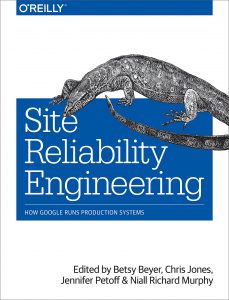Note: The first 2 episodes of the interview series can be found here and here.
Question 1:
The interviewer comes in and hands you the following ls -la listing:
# ls -la total 108 dr-xr-x---. 7 root root 4096 Sep 5 07:16 . dr-xr-xr-x. 22 root root 4096 Sep 1 17:43 .. -rw-------. 1 root root 15432 Sep 5 06:36 .bash_history -rw-r--r--. 1 root root 18 May 20 2009 .bash_logout -rw-r--r--. 1 root root 176 May 20 2009 .bash_profile -rw-r--r--. 1 root root 176 Sep 23 2004 .bashrc -rw-r--r-- 1 root root 0 Sep 5 07:16 -f ...
They say the -f file must go; would you please delete it?
I’d like to present you the book I am trying to finish reading for some time now; a very dense book, with good practices and interesting details on how to keep planet-wide systems up & running with a bunch of very well prepared people.

What are the lessons one needs to walk away with, from this book? A few bullets:
Trying to start a career in a Computer Sciences field is a challenge by itself; starting with a good company is, most of the time, a matter of luck. I’m not trying to provide an alternate view to this – yes, one needs a ton of luck in order to get on with a good start. I’m just trying to show you where the train you just boarded may lead you – or where it may not. Switching trains is by any means possible, but it becomes harder as one gets older.
Without looking in depth, companies may be divided in 2 main categories:
-
Product Owners: companies that build products for an actual market; they either sell software or provide services to private or business users through their internally managed infrastructure.
-
Outsourcers: companies that sell “work units” directly or indirectly to either companies from the first category or to other businesses.
There are nuances to this classification; government contractors and start-ups may actually deserve categories of their own.
What can a fresh graduate expect out of each company type?